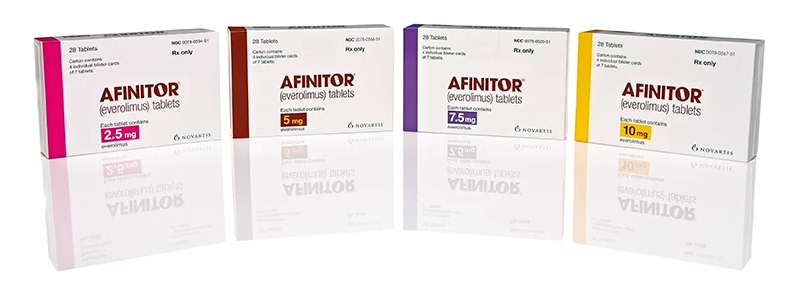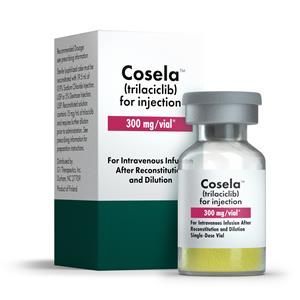Afinitor (everolimus) vs Cosela (trilaciclib)
Afinitor (everolimus) vs Cosela (trilaciclib)
Afinitor (everolimus) is an mTOR inhibitor primarily used in the treatment of various types of cancer, including advanced renal cell carcinoma, certain breast cancers, and neuroendocrine tumors, among others; it works by interfering with cellular growth and proliferation. Cosela (trilaciclib), on the other hand, is a CDK4/6 inhibitor designed to protect bone marrow cells from damage caused by chemotherapy; it is administered before chemotherapy to patients with small cell lung cancer to reduce the occurrence of chemotherapy-induced myelosuppression. When deciding between Afinitor and Cosela, it is important to consider the type of cancer being treated, the goal of therapy (tumor control versus protection from chemotherapy side effects), and the specific recommendation of an oncologist, as these medications have different indications and mechanisms of action.
Difference between Afinitor and Cosela
| Metric | Afinitor (everolimus) | Cosela (trilaciclib) |
|---|---|---|
| Generic name | Everolimus | Trilaciclib |
| Indications | Advanced hormone receptor-positive, HER2-negative breast cancer, advanced neuroendocrine tumors, renal cell carcinoma, tuberous sclerosis complex-associated seizures, renal angiomyolipoma, and subependymal giant cell astrocytoma | Used to decrease the incidence of chemotherapy-induced myelosuppression in adult patients when treated with extensive-stage small cell lung cancer |
| Mechanism of action | mTOR inhibitor | CDK4/6 inhibitor |
| Brand names | Afinitor, Afinitor Disperz, Zortress | Cosela |
| Administrative route | Oral | Intravenous |
| Side effects | Mouth ulcers, infections, rash, fatigue, diarrhea, edema, abdominal pain, nausea, fever, and pneumonitis among others | Fatigue, hypocalcemia, hypokalemia, hypophosphatemia, increased aspartate aminotransferase, headache, pneumonia, increased blood creatinine, and decreased weight among others |
| Contraindications | Hypersensitivity to everolimus or other rapamycin derivatives | Hypersensitivity to trilaciclib |
| Drug class | Immunosuppressant, Antineoplastic agent | Cyclin-dependent kinase inhibitor |
| Manufacturer | Novartis | G1 Therapeutics |
Efficacy
Afinitor (Everolimus) Efficacy in Lung Cancer
Afinitor (everolimus) is a medication that has been primarily used to treat various types of cancer by inhibiting the mammalian target of rapamycin (mTOR), a protein that regulates cell growth, proliferation, and survival. In the context of lung cancer, everolimus has shown efficacy in treating advanced non-small cell lung cancer (NSCLC) after the failure of certain chemotherapy regimens. Clinical trials have demonstrated that everolimus can provide a benefit in terms of disease stabilization and progression-free survival in this patient population. However, its role in lung cancer treatment is often as a second-line or later therapy, and its efficacy may be influenced by the molecular characteristics of the tumor, such as mutations in the mTOR pathway.
Despite its potential benefits, everolimus is not universally effective for all lung cancer patients. Its efficacy can be limited, and the treatment may be associated with a range of adverse effects that require careful management. It is important for patients to discuss the potential risks and benefits of everolimus with their healthcare provider to determine if it is an appropriate treatment option for their specific case of lung cancer.
Cosela (Trilaciclib) Efficacy in Lung Cancer
Cosela (trilaciclib) is a relatively new entrant in the field of oncology, specifically designed to protect bone marrow from damage caused by chemotherapy. It is a cyclin-dependent kinase 4/6 (CDK4/6) inhibitor that is administered before chemotherapy to patients with extensive-stage small cell lung cancer (ES-SCLC). The efficacy of trilaciclib has been evaluated in clinical trials where it has been shown to significantly reduce the occurrence of severe neutropenia, a common and potentially dangerous side effect of chemotherapy that can lead to infections and interruptions in cancer treatment.
Moreover, trilaciclib has been associated with improvements in overall survival and progression-free survival in patients with ES-SCLC when used in conjunction with chemotherapy, compared to chemotherapy alone. The use of trilaciclib as a supportive care treatment has the potential to not only improve the tolerability of chemotherapy but also enhance its effectiveness by allowing patients to maintain the intended dose and schedule. As with any medication, the decision to use trilaciclib should be made in consultation with a healthcare provider, taking into account the individual patient's treatment plan and overall health status.
Regulatory Agency Approvals
Afinitor
-
European Medical Agency (EMA), European Union

-
Food and Drug Administration (FDA), USA

-
Health Canada

-
Pharmaceuticals and Medical Devices Agency (PMDA), Japan

-
Therapeutic Goods Administration (TGA), Australia

Cosela
-
Food and Drug Administration (FDA), USA

Access Afinitor or Cosela today
If Afinitor or Cosela are not approved or available in your country (e.g. due to supply issues), you can access them via Everyone.org.
How it works

Make an enquiry
Choose the medicine you want to buy, answer a couple of questions, and upload your prescription to speed things up. We’ll get back to you within 24 hours.


Make an enquiry
Choose the medicine you want to buy, answer a couple of questions, and upload your prescription to speed things up. We’ll get back to you within 24 hours.


Breeze through the paperwork
We'll guide you through the required documents for importing unapproved medicine, ensuring you have all the necessary information.


Get a personalized quote
We’ll prepare a quote for you, including medicine costs and any shipping, administrative, or import fees that may apply.


Receive your medicine
Accept the quote and we’ll handle the rest - sourcing and safely delivering your medicine.

Some text on this page has been automatically generated. Speak to your physician before you start a new treatment or medication.
Let's talk
If you have any questions, call us or send us a message through WhatsApp or email:
Contact us




